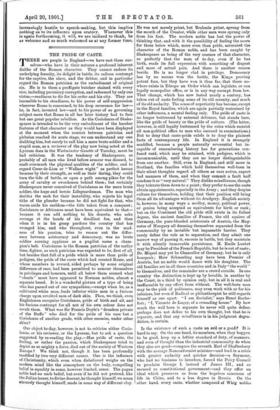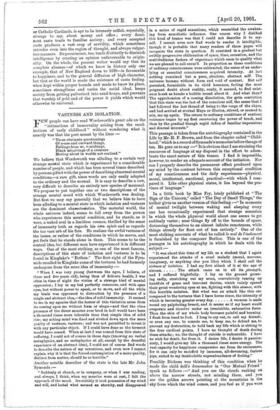THE PRIDE OF CASTE.
THERE are people in England—we have met them our- selves—who have in their natures a profound inherent dislike of the Roman character. They cannot endure its underlying ferocity, its delight in battle, its callous contempt for the captive, the slave, and the debtor, and in particular regard the Roman patrician as the embodiment of original sin. He is to them a profligate butcher stained with every vice, including pecuniary corruption, and redeemed by only one virtue,—readiness to die for his order and his city. They are insensible to his steadiness, to his power of self-suppression wherever Rome is concerned, to his deep reverence for law— he, in fact, invented law—and to his power of so governing subject races that Rome in all her 'later history had to face but one great popular rebellion. As the Coriolanus of Shake- speare is intended to be the very embodiment of the harsher features of that character as they would have been displayed at the moment when the contest between patrician and plebeian reached its acute stage, we can understand any one disliking him, but surely to call him a mere brute soldier and a stupid man, as a reviewer of the play now being acted at the Lyceum does in the Westminster Gazette of Tuesday, must be bad criticism. It was the tendency of Shakespeare, as probably of all men who lived before armour was disused, to exalt overmuch the physical qualities of the soldier, and to regard Cceur-de-Lion or "Wallace wight " as perfect heroes because by their strength, as well as their daring, they could turn the tide of battle, or open a path among pikes for the array of cavalry or swordsmen behind them ; but certainly Shakespeare never conceived of Coriolanus as the mere brute soldier, the huge and heroic Lifeguardsman. The man who derides the mob for their instability, who rejects his legal tithe of the plunder because he did not fight for that, who waves aside his earldom—the title taken from a conquest ; Coriolanus or Africanus must have been equivalent to that— because it can add nothing to his deserts, who asks revenge at the hands of his deadliest foe, and then when it is in his grasp pardons the country that has wronged him, and who throughout, even in the mad- ness of his passion, tries to reason out the differ- ence between aristocracy and democracy, was no brute soldier earning applause as a pugilist earns a cham- pion's belt. Coriolanus is the Roman patrician pf the earlier time, fighter, as such patrician was expected to be, first of all but besides that full of a pride which is more than pride of pedigree, the pride of the caste which had created Rome, and whose members in reward, aided perhaps by some original difference of race, had been permitted to armour themselves In privileges and honours, until all below them seemed what " churls " must have appeared to Norman nobles, almost a separate breed. It is a wonderful picture of a type of being who has passed out of our sympathies,—except when he, as a cultivated white man, leads inferior white men in a furious charge upon revolted men of dark skin. Then, we think, even Englishmen recognise Coriolanus, pride of birth and all, and his furious contempt for all not of his own colour does not revolt them. What was Sir Francis Doyle's "drunken private of the Buffs" who died for the pride of his race but a Coriolanus of another grade, with other enemies, under other skies ?
Our object to-day, however, is not to criticise either Corio- lanus, or his reviewer, or the Lyceum, but to ask a question suggested by re-reading the play,—Has pride of caste, the feeling, or rather the passion, which Shakespeare tried to depict as so mighty a force, died out of the society of Western Europe ? We think not, though it has been profoundly modified by two very different causes. One is the influence of. Christianity, which even when disbelieved weighs on the -modern. mind like the atmosphere on the body, compelling belief in equality in some, however limited, sense. The pagan noble had no such belief, but even if he did not pretend, like the Julian house, to divine descent, he thought himself, we mean sincerely thought himself, made in some way of different clay. He was not merely priest, but Brahmin priest, sprung from the mouth of the Creator, while other men were sprung only. from his foot. The modern noble has lost the power of thinking that, and with it the possibility of feeling the scorn for those below which, more even than pride, saturated■ the character of the Roman' noble, and has been caught by Shakespeare as being of the very essence of that character, so perfectly that the man of to day, even if he has birth, reads its full expression with something of disgust and more of actual pain. And there is another reason beside. He is no longer clad in privilege. Democracy has by no means won the battle, the Kings proving potent foes, but they have won it thus far, that there no- where exists in Edrope an Order which can legislate, or can legally monopolise office, or is in any way exempt from law. That change, which has now lasted nearly a century, has taken out of caste feeling some of its old serenity, and much of its old audacity. The sense of superiority has become, except in.the Royal families, which are again partially restrained by other influences, a mental feeling only. The pride of caste is no longer buttressed by external defences, but stands bare, like the pride of beauty or the pride of culture. (The latter, however, is still legally buttressed by the rules which restrict all non-political office to men who succeed in examinations.) But to deny that caste-pride exists is to deny the plainest facts of contemporary life. In England it is strangely muddled, because a people naturally reverential but in- capable of remembering history has for generations con- fused rank, which may be attained, with pedigree, which is incommunicable, until they are no longer distinguishable from one another. Still, even in England, and still more in Scotland, the families which hold themselves well-born in their silent thoughts regard all others as sous autres, expect bad manners of them, and when they commit a fault half condone it as "very natural." They dislike misalliances, though they tolerate them down to a point ; they prefer to see the caste obtain appointments, especially in the Army ; and they despise culture for themselves, holding that their position will bring them all its advantages without its drudgery. English society is, however, in many ways a medley, money, political power, or genius being accepted as equivalents for birth or rank; but on the Continent the old pride still exists in its fullest degree, the ancient families of France, the old squires of Germany, the pure-blooded aristocrats of Austria, the Mag- nates of Hungary all deeming themselves separated from the commonalty by an invisible but impassable' barrier. They rarely define the rule as to separation, and they admit one narrow way of passing it, success in battle, but they maintain it with silently immovable persistence. M. Emile Loubet may be President of the French Republic, but he is out of caste; Dr. Miguel may yet be Chancellor of Germany, but he is only bourgeois; Herr Schmerling may have been Premier of Austria, but no noble would dance with his daughter. The old families are in all these countries and in Italy " the world " to themselves, and the remainder are a crowd outside. In one country the. distinction is kept up by heralds, in another by the Court, in a third by opinion only, but in all it is real and ineffaceable by any effort from without. The well-born man may be the pink of politeness, may even work with or for his inferiors, but even if Radical or philanthropist he still regards himself as one apart. "I am Socialist," says Henri Roche- fort; "I, Vicomte de Lucay, of a crusading house." By how much the well born is separate he never will quite define, perhaps does not define to his own thought, but that he is separate, and that any misalliance is in his judgment degra- dation, is certain.
Is the existence of sach a caste an evil or a good P It is bard to say. On the one hand, its members, when they happen to be good, keep up a loftier standard of duty, of manners, and even of thought than the industrial commonalty do when they also are good—compare the seventh Earl of Shaftesbury with the average Nonconformist minister—and lead in a crisis with greater audacity and quicker decision—a Seymour, who had no business to interfere, forced the Privy Council to proclaim George L instead of James III., and so secured us constitutional government—and they offer an ideal which preserves us from the hopeless sameness of life in China, and to a less degree in Russia. On the other hand, every caste, whether composed of Whig nobles
or Catholic Cardinals, is apt to be intensely selfish, especially, strange to say, about money and office ; every domi- nant caste tends to fossilise society ; and every accepted caste produces a vast crop of servility, which sometimes intrudes even into the region of thought, and always vulgar- ises manners. Its prominence, too, tends distinctly to diminish intelligence by creating an opinion unfavourable to origin- ality. On the whole, the present writer would say that its complete absence—of which we know in history only one example, that of New England down to 1830—is favourable to happiness, and to the general diffusion of high character, but that as the world is made the existence of caste feeling. when kept within proper bounds and made to know its place, sometimes strengthens and varies the social ideal, keeps society from getting pulverised into sand-heaps, and prevents that worship of gold and of the power it yields which would otherwise be universal.







































 Previous page
Previous page